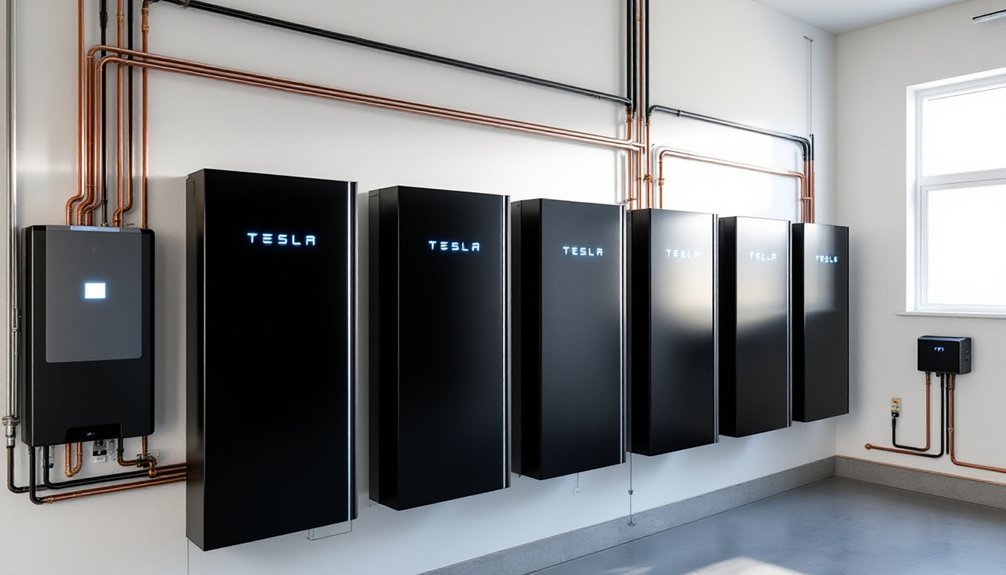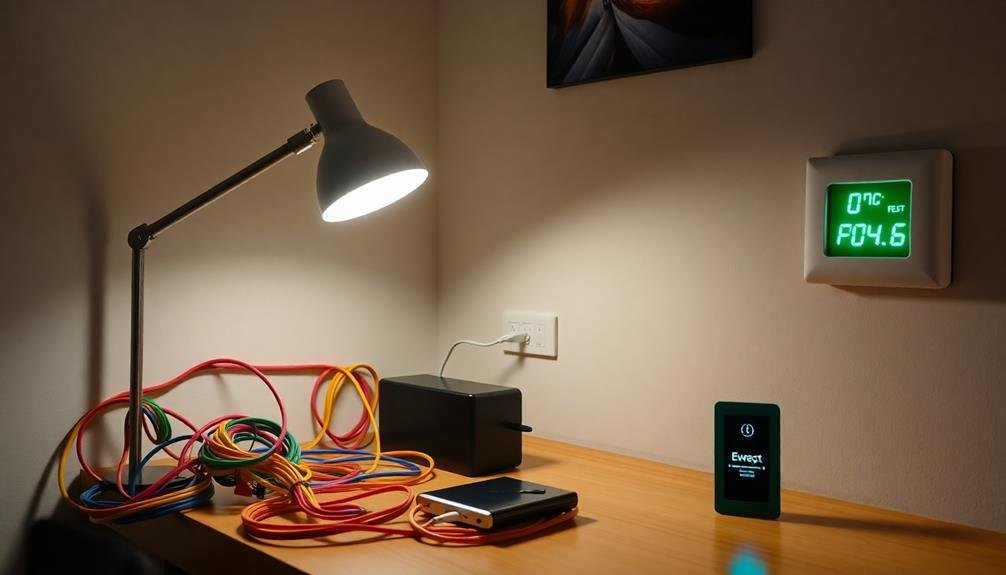If you're considering a solar setup for your home, you'll quickly discover that the battery storage system is just as essential as the panels themselves. You've probably heard about Tesla's Powerwall, but there's a whole world of reliable storage solutions that could better suit your needs and budget. From compact wall-mounted units to expansive whole-house systems, today's options offer impressive features that can maximize your solar investment. Let's explore the most dependable choices available right now.
16kwh LiFePO4 Wall-Mounted Solar Storage Battery System
If you're seeking a robust solar storage solution that can power an entire household, the 16kWh LiFePO4 wall-mounted battery system delivers exceptional performance with its 51.2V 314Ah capacity and 16000W maximum output power.
You'll benefit from its 15+ year lifespan and 6000+ cycle times, far surpassing traditional lead-acid batteries. The system's built-in 100A BMS protects against common battery issues, while its expandable design lets you connect up to 15 units for a total capacity of 240kWh. Monitor your system's performance in real-time via Bluetooth using your phone or laptop, and rest easy with a 10-year warranty and lifetime tech support.
Best For: Homeowners seeking a high-capacity, long-lasting solar storage solution for whole-house power backup and significant energy bill reduction through solar integration.
Pros:
- Exceptional longevity with 15+ year lifespan and 6000+ cycle times
- Highly expandable system capable of scaling up to 240kWh with 15 units
- Comprehensive protection features with built-in 100A BMS and real-time monitoring capabilities
Cons:
- Long shipping time of 35-65 days via sea transport
- Significant initial investment required for the system
- Limited to 150A maximum discharge current which may restrict some industrial applications
Powerwall 10kWh Solar Storage Lithium Battery System
Solar enthusiasts seeking a robust and expandable storage solution will find the Powerwall 10kWh Solar Storage Lithium Battery System an ideal choice. You'll get reliable performance from its 16 Grade A+ prismatic cells, offering over 6000 cycles and a 10-year lifespan. The system's touch screen lets you monitor voltage, current, and energy in real-time.
The proprietary BMS protects your investment against common battery issues while supporting multiple inverter connections. You can expand the system up to 30 batteries in parallel, and installation is straightforward with included mounting hardware. Plus, you'll benefit from eco-friendly design and extensive safety features, all backed by a 5-year warranty.
Best For: Homeowners and businesses seeking a scalable, high-performance solar storage solution with advanced monitoring capabilities and proven safety features.
Pros:
- Highly expandable system supporting up to 30 batteries in parallel for increased capacity
- Advanced touch screen interface provides real-time monitoring of vital battery metrics
- Long lifespan with 6000+ cycles and comprehensive protection through proprietary BMS
Cons:
- 5-year warranty period is relatively short compared to the 10-year expected lifetime
- Initial investment may be significant, especially when expanding with multiple units
- Requires compatible inverter systems for optimal performance and monitoring capabilities
ECO-WORTHY 200W Solar Panel Starter Kit with Battery and Inverter
The ECO-WORTHY 200W starter kit offers an ideal entry point for newcomers to solar power, especially those outfitting RVs, boats, or small cabins. You'll get a complete system including solar panels, a 30A charge controller, 50Ah lithium battery, and 600W inverter.
The system's durability impresses with its aluminum-framed panels that withstand harsh weather, while the lithium battery delivers 4,000-15,000 recharge cycles. You'll appreciate the pure sine wave inverter's 92% efficiency, though you might notice limitations during low sunlight periods. While installation proves straightforward, you may need to manage power carefully in winter months.
Best For: First-time solar power users seeking a complete, beginner-friendly system for RVs, boats, or small cabins requiring basic power needs up to 800Wh daily.
Pros:
- Complete all-in-one kit with high-quality components including durable aluminum-framed panels and long-lasting lithium battery
- High-efficiency pure sine wave inverter (92% conversion) suitable for sensitive electronics
- Excellent battery lifespan with 4,000-15,000 recharge cycles compared to traditional lead-acid batteries
Cons:
- Some users report missing installation components and occasional quality control issues
- System performance can be limited during low-light conditions or winter months
- 600W inverter may shut down under heavy loads, requiring careful power management
ExpertPower 100W 12V Solar Power Kit with Battery and Controller
Homeowners seeking a complete entry-level solar solution will find the ExpertPower 100W 12V Solar Power Kit an appealing choice. You'll get a 100W monocrystalline panel, 10A PWM charge controller, and 21Ah gel battery in one package.
The system's versatility shines through its compatibility with various battery types, including lead-acid and lithium options. While installation requires some wire stripping, most users complete setup within two hours. You can power outdoor lights, charge devices, and run small pumps effectively.
Be aware that some users report lower-than-expected charging rates and panel positioning challenges. For outdoor installations, you'll want to add weatherproofing components.
Best For: Entry-level solar enthusiasts and homeowners looking for a complete, small-scale solar power solution for basic outdoor electrical needs and device charging.
Pros:
- Complete all-in-one kit includes everything needed to get started with solar power
- Versatile battery compatibility supports multiple battery types including lead-acid and lithium
- Durable construction with tempered glass and corrosion-resistant aluminum frame
Cons:
- Some users report significantly lower charging rates than advertised
- Installation requires wire stripping and may be challenging for beginners
- Additional weatherproofing components needed for outdoor installation
SOLPERK 20W 12V Solar Panel Battery Charger Kit
With impressive versatility across multiple battery types, SOLPERK's 20W 12V Solar Panel Battery Charger Kit serves as a perfect maintenance solution for vehicle and small equipment owners. You'll benefit from its efficient monocrystalline cells that deliver 21-30% conversion rates and an intelligent 8A controller that prevents overcharging.
The kit's durability stands out with its tempered glass construction and aluminum frame, withstanding extreme weather while lasting up to 25 years. You can easily adjust the mounting bracket 360 degrees for maximum sun exposure, and the plug-and-play design guarantees quick setup. While some users note short cord lengths, the kit's reliable performance in cold weather and low light conditions makes it a solid choice.
Best For: Vehicle owners, RV enthusiasts, and small equipment operators who need a reliable maintenance charger for 12V batteries in various weather conditions.
Pros:
- High-quality construction with tempered glass and aluminum frame offering exceptional durability and 25-year lifespan
- Advanced 8A smart controller with three-stage charging prevents battery damage and provides 20-30% higher efficiency
- Versatile compatibility with multiple battery types and 360-degree adjustable mounting for optimal positioning
Cons:
- Included cables may be too short for some applications
- 20W power output may be insufficient for larger batteries or heavy-duty charging needs
- Some users report issues with included wiring quality and may need to upgrade components
10kwh Solar Storage Lithium Battery 48V for Home Backup System
Power-conscious households seeking reliable backup solutions will find the 10kWh lithium battery system an ideal match for their needs. This 51.2V system delivers 10,000W of maximum output power and connects seamlessly with mainstream inverters.
You'll get impressive longevity with 6000+ cycle times and a 15+ year lifespan, protected by a built-in 150A BMS against common battery issues. The system's expandability lets you scale from 10kWh to 150kWh, powering virtually all household appliances during outages. You can monitor performance through your smartphone via Bluetooth, and you're backed by a 10-year warranty with lifetime tech support.
Best For: Homeowners seeking a reliable, long-term backup power solution with scalable capacity and smart monitoring capabilities.
Pros:
- Exceptional longevity with 6000+ cycles and 15+ year lifespan, backed by a 10-year warranty
- Expandable capacity up to 150kWh with the ability to connect multiple units
- Advanced BMS protection and real-time monitoring via smartphone
Cons:
- Requires separate inverter purchase for operation
- Long shipping time of 30-65 days via sea transport
- Significant initial investment compared to traditional lead-acid batteries
50kWh LiFePO4 Home Energy Storage Battery for Solar System
Large families and businesses requiring substantial backup power will find the Dawnice 50kWh Home Energy Storage Battery an ideal solution for their solar setups. You'll get five parallel-connected 51.2V modules delivering a robust 206Ah capacity, all protected by a 100A Battery Management System.
This LiFePO4 system boasts a 6000+ cycle life and 10-year warranty, far outlasting traditional lead-acid alternatives. You can expand it up to 80kWh by connecting additional modules, making it perfect for powering multiple appliances during outages. Despite its hefty 770-pound weight, built-in wheels make repositioning manageable. The modular design guarantees straightforward installation and future upgrades.
Best For: Large households, businesses, or solar system owners needing substantial backup power capacity and willing to make a significant upfront investment in long-term energy independence.
Pros:
- Impressive 50kWh capacity with expandability up to 80kWh provides extensive backup power for multiple appliances
- Long 6000+ cycle life and 10-year warranty offer excellent long-term value
- Advanced BMS protection and modular design ensure safety and easy installation/upgrades
Cons:
- High initial cost and significant weight of 770 pounds may be prohibitive for some users
- Long shipping time of 20-45 days due to sea transport only restriction
- Limited to indoor installation and requires considerable space (approximately 28 x 16 x 33 inches)
Factors to Consider When Choosing the Most Reliable Battery Storage Systems for Solar Setups
When you're selecting a battery storage system for your solar setup, you'll need to evaluate essential factors like battery chemistry, expected lifespan, and the required storage capacity that matches your energy consumption patterns. Your choice must align with your charge controller's specifications and power output requirements to guarantee peak system performance and efficiency. The system's safety features, including temperature controls, overcharge protection, and emergency shutdown capabilities, will protect your investment and provide peace of mind.
Battery Chemistry and Longevity
Every homeowner investing in solar energy must carefully consider battery chemistry and longevity when selecting a storage system. You'll find that lithium iron phosphate (LiFePO4) batteries stand out with their impressive 15-year lifespan and 6,000+ cycles, far surpassing traditional lead-acid options that last only 3-5 years.
Modern lithium batteries come equipped with sophisticated battery management systems that protect your investment by preventing overcharging and overheating. You'll benefit from their low self-discharge rate, which means your stored energy stays available longer. When your energy needs grow, you can easily expand your lithium battery system's capacity. Though initial costs may be higher, you'll save money in the long run thanks to their superior efficiency and minimal degradation over time.
Storage Capacity Requirements
As you plan your solar storage system, determining the right battery capacity stands as a crucial first step. You'll need to match your storage capacity to your household's energy consumption in kilowatt-hours (kWh), guaranteeing you have enough power for both peak and off-peak periods.
Look for systems that offer expandable capacity, allowing you to start with a base unit of around 10kWh and scale up to 80kWh as your needs grow. You'll want your battery storage to cover 1.5 to 2 times your daily usage to account for nighttime and cloudy days. Consider the system's maximum output power, typically ranging from 10,000W to 16,000W, to make certain it can handle multiple appliances running simultaneously. Don't forget to check the battery's cycle life – reliable lithium batteries should offer at least 6,000 cycles.
Charge Controller Compatibility
Beyond sizing your battery system correctly, selecting a compatible charge controller represents a key factor in your solar setup's success. You'll need to match your charge controller's specifications with both your solar panels' output and your battery type. For lithium-ion or LiFePO4 batteries, you'll typically want an MPPT controller, while some lead-acid systems can work effectively with PWM controllers.
Always verify your controller's current rating exceeds your panels' maximum output. Modern smart controllers offer valuable monitoring features that help you track system performance and battery health. When selecting your controller, check its compatibility with your battery's BMS to maintain proper communication and protection against faults. This integration guarantees your batteries receive the best charging patterns while being protected from overcharging and excessive discharge.
Power Output Specifications
Power output specifications form the backbone of your battery storage system's performance capabilities. When selecting a system, you'll need to evaluate the maximum power output, which typically ranges from 5,000W to 16,000W for lithium batteries. This range guarantees you can run multiple household appliances simultaneously during peak usage.
Pay attention to the maximum discharge current, which usually falls between 100A to 150A. This specification determines how well your system handles high-load applications. If you're planning for extended power outages or wanting to minimize grid dependence, look for higher capacity batteries offering 10kWh to 50kWh storage. Don't forget to verify that your chosen system works with mainstream inverters – this compatibility directly impacts your solar setup's overall efficiency and reliability during demanding situations.
Safety Features Analysis
When selecting a battery storage system for your solar setup, safety features should be your top priority. Look for systems with integrated Battery Management Systems (BMS) that protect against multiple risks, including overcharging, over-discharging, and short circuits.
You'll want to verify your chosen system uses Grade A battery cells that deliver over 6,000 cycle times, greatly reducing failure risks. Check for low self-discharge rates, which help maintain peak performance during periods of non-use. The best systems undergo extensive safety testing, including puncture, fire, and impact assessments.
Consider eco-friendly options that don't use heavy or rare metals – they're not just better for the environment but often meet stricter safety standards. These systems demonstrate that sustainability and safety can work hand in hand.
Expansion and Scalability Options
Since future energy needs can be unpredictable, choosing a battery storage system with robust expansion options proves crucial for long-term satisfaction. You'll want to focus on modular systems that allow you to connect multiple units in parallel, expanding your capacity from basic levels like 10kWh up to substantial amounts like 80kWh or more.
Look for systems that support up to 15 connected units, potentially providing up to 240kWh of storage for extended outages. The best options offer simple installation processes and don't require major modifications when adding capacity. Make certain your chosen system's cycle life can handle the expansion, with top performers offering over 6,000 cycles and 15-year lifespans. Also, verify compatibility with your existing inverter to guarantee seamless integration of additional modules.
Weather Resistance Ratings
A battery system's weather resistance rating serves as a crucial indicator of its ability to withstand harsh environmental conditions. When you're selecting a solar battery system, you'll want to look for units that can handle wind pressures of at least 2400Pa and snow loads of 5400Pa, ensuring reliable performance in extreme weather.
Pay attention to the construction materials, particularly corrosion-resistant aluminum frames and tempered glass, as they're essential for long-term durability. Your system should also feature extensive weatherproofing, including waterproof designs and protective coatings that minimize maintenance requirements. These features aren't just add-ons; they're critical components that determine how well your battery system will perform across different climates. By choosing a system with robust weather resistance ratings, you'll secure a more reliable and longer-lasting investment.
Installation Space Planning
Before installing a battery storage system, you'll need to carefully evaluate your available space dimensions and structural capabilities. Large units like 50kWh batteries can measure nearly 28 x 16 x 34 inches and weigh up to 770 pounds, requiring robust mounting solutions and adequate structural support.
You'll want to select a location with proper ventilation to manage heat during operation. Since many systems offer real-time monitoring through smartphones or laptops, choose an accessible spot that allows easy maintenance and regular system checks.
Don't forget to plan for future expansion. If you're starting with a 16kWh battery but anticipate growing energy needs, leave extra space to accommodate additional units. This forward-thinking approach will save you from costly relocations or reinstallations down the line.
Frequently Asked Questions
How Long Does It Take to Fully Charge a Solar Battery System?
You'll typically need 5-8 hours of direct sunlight to fully charge your solar battery system, but it varies based on your battery's capacity, solar panel output, and weather conditions you're experiencing.
Can I Install a Battery Storage System Without Professional Help?
While you can install basic battery systems yourself, it's not recommended due to safety risks and complex electrical work. You'll need proper permits, and incorrect installation could void warranties or create dangerous conditions.
What Happens to Stored Energy During Extended Power Outages?
During a power outage, you'll be able to use your stored energy until it's depleted. Your batteries will continue powering essential loads, but you'll need to manage consumption carefully to extend backup duration.
Are Battery Storage Systems Eligible for Government Tax Incentives?
Yes, you'll qualify for the federal tax credit of up to 30% when you install a battery storage system. Many states also offer additional incentives, but you'll need to check your local regulations.
Can Extreme Weather Conditions Affect Battery Storage System Performance?
Yes, extreme temperatures can greatly impact your battery's performance. You'll notice reduced capacity in cold weather and potential damage in extreme heat. It's best to install your system in temperature-controlled environments for ideal efficiency.





Leave a Reply